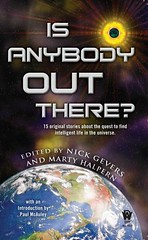So, whereas we're all hoping that our first contact with alien races goes something like E. T. the Extra-Terrestrial, Hawking portends a scenario that is more on the order of Independence Day. As he says elsewhere in this Times article: "We only have to look at ourselves to see how intelligent life might develop into something we wouldn’t want to meet. I imagine they might exist in massive ships, having used up all the resources from their home planet. Such advanced aliens would perhaps become nomads, looking to conquer and colonise whatever planets they can reach."
Sort of gives you those warm fuzzies all over, don't it? But, until such time as we actually experience (if ever) that first contact with an alien life form, we can only use the tools available to us to extrapolate (or, best case, guess) as to what that encounter may be like.
In 1950, Enrico Fermi postulated a contradiction (aka paradox): If there are uncountable galaxies within our universe, each containing uncountable planets, and some percentage of those planets are habitable (by our human definition of "habitable"), then why is there no evidence -- at least none that we have found and understood so far -- of alien civilizations? And it is those eleven words that I have set off by em-dashes and placed in italics that are the key to this paradox. The evidence may be out there, but our scientists and researchers simply do not understand it1. The stories in this anthology attempt to answer the Fermi Paradox. Some of these stories utilize current science; others bend and twist that science; and more than one story is pure SWAG2.
In previous blog posts I have waxed poetic on the genesis of this anthology; on the contents of this anthology; and on the cover and back cover text. And in this blog post I would like to take this opportunity to share with you the first review of Is Anybody Out There?
The review -- by the inestimable Gardner Dozois -- appears in the May 2010 issue of Locus Magazine. Just on the extremely rare chance that you are not familiar with Mr. Dozois, let me quote a few lines from his entry in Wikipedia: "...best known as an editor, winning a record 15 Hugo Awards for Best Professional Editor (having won nearly every year between 1988 and his retirement from Asimov's in 2004)....[and] the editor of the anthology series The Year's Best Science Fiction, published annually since 1984."
The review:
One of the key mysteries to confront both modern science and modern science fiction is the Fermi Paradox, devised by the great physicist Enrico Fermi, which can be simply stated as, Where Is Everybody? If there are really millions of star-systems in the universe capable of supporting life, as scientists theorized in the early part of the 20th Century, a large percentage of which may have developed technological civilizations, then why haven't any of those alien civilizations visited us? Why can't we even find any trace of them? Can it possibly be true that, against all odds, we're alone in the universe after all, that Earth is the only planet where intelligent life-and perhaps life of any sort-exists? Many writers have offered fictional solutions to the Fermi Paradox in the last few years, and now Nick Gevers and Marty Halpern have assembled a bunch of new takes on the subject in the original anthology Is Anybody Out There? A bit dry and abstract, perhaps, with lots of metafiction of various sorts, this is still a good deal more substantial than the average DAW anthology, and contains a lot of good reading -- although not, I think, any award-winners. The best stories here are "Permanent Fatal Errors," by Jay Lake, "The Taste of Night," by Pat Cadigan, and "The Word He Was Looking for Was Hello," by Alex Irvine, but there's also good stuff by Matthew Hughes, Paul Di Filippo, Sheila Finch, David Langford, Felicity Shoulders and Leslie What, and others. The two most frequent solutions to the Paradox suggested here, by the way, is that the universe is actually a whole lot smaller than we think that it is or (one I lean toward myself) that we're surrounded and bombarded by communications from alien civilizations all the time, but just don't know how to recognize them.
--------------
Notes and Footnotes
1 In a previous post I blogged about a new book entitled The Eerie Silence: Renewing Our Search for Alien Intelligence by Paul Davies, in which he speaks to this specific point, ie. the possibility of not understanding alien contact.
2 At some point, the term "SWAG" has come to mean freebies, promotional items -- the stuff one obtains for free (often included in some sort of carry bag) upon attendance at a convention. But I recall my days at UCLA when SWAG meant "Scientific Wild Ass Guess" -- and that's the definition I am employing here.
If you've read this far... You have a chance to win a free copy of the anthology Is Anybody Out There? should you choose not to purchase your very own copy. @TheSciFiChick is giving away a copy of the book on her website SciFiChick.com; there is a simple online form to complete, and then you click the Submit key. That's it! The giveaway ends on June 4. So, don't delay in entering to win.


No comments:
Post a Comment